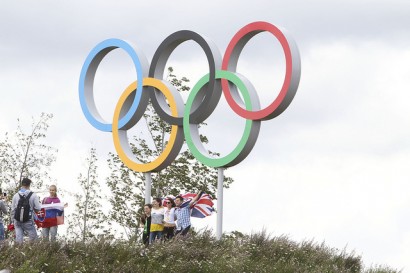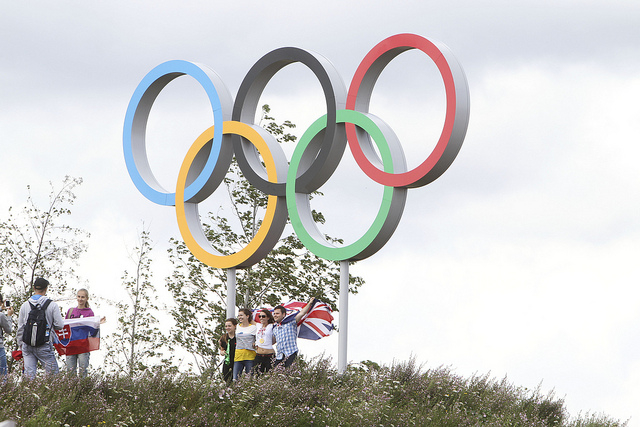
(Photo – The Department for Culture, Media and Sport)
More than ever American media coverage of the Olympic Games is being offered in both English and Spanish. As a viewer I’ve benefitted from being bilingual, and not just because I can understand what the Mexican divers are saying to each other without subtitles.
It’s almost impossible to fully cover the games; there is just too much going on. But between NBC and their Spanish-language network Telemundo, I get a decent overview of the games, one that is broader than the coverage offered just on NBC.
NBC has exclusive U.S. rights to broadcast the Olympics. They also own Telemundo, so the majority of the Spanish-language coverage has been on that network. The first thing you notice when watching the two channels is how much more broadcast time NBC devotes to Olympics coverage. They show the games on a five-hour tape delay all day long. On Telemundo, the broadcast time is mostly in the evenings. The overwhelming majority of Telemundo’s coverage is online.
Telemundo has set up its largest-ever digital platform to show the games. All told they will offer over 200 hours of digital Spanish-language content over the course of the Olympic Games in London. This includes live streaming events, particularly those involving Latin American countries or Latino athletes, as well as commentary, highlights, and color pieces on high profile Latino competitors like Dannell Leyva and Ryan Lochte. You can see it all on NBCOlympics.com/Telemundo.
Why is so much of the Spanish-language coverage online and not on broadcast TV? Simple: It’s a lot cheaper. Though number 3 ranked NBC has received a huge ratings boost from the Olympics, all of that broadcast time has to be paid for upfront. NBC probably figures that it’s in their best financial interest to concentrate their TV coverage on English-language stations while still providing plenty of coverage in Spanish on the less expensive digital platform.
While NBC seems to focus mainly on American athletes, Telemundo shows lots of different countries competing as well as the U.S. They mostly concentrate on Latin American countries, which makes sense since many Latino immigrants are interested in watching their home country’s team.
NBC’s coverage heavily favors certain sports. In the first week, swimming, gymnastics, biking, and basketball received most of their broadcast time. In their primetime spots that’s about all they showed. Telemundo, on the other hand, shows these sports as well as soccer, boxing and other sports. Telemundo is broadcasting nearly all of the soccer games in which at least one of the teams is from Latin America.
There has been a lot of criticism of NBC’s commentary during the games. In particular Bob Costas, Meridith Viera, Matt Lauer, and Ryan Seacrest have been called out for their inane and occasionally culturally insensitive banter. Take, for example, Bob Costas’s Idi Amin joke when Uganda’s players marched in during the opening ceremonies or when Costas talked about Gabby Douglas’s race after she won the gold medal for women’s gymnastics.
Telemundo has legendary sportscaster Andres Cantor leading their coverage. He’s more affable and friendly than Costas and has managed to offer quality commentary on the games without making thousands of viewers angry. Joining him are former Olympians Nicolás Massú and Ramon Rivas who have a little more pertinent experience than American Idol host Ryan Seacrest.
In the harsh reality of modern television, NBC has to do all it can to boost its ratings. If they were to fully cover badminton or speed walking, they would probably lose advertisers. So, if 17 hours a day of Michael Phelps and women’s gymnastics gets higher numbers, then that’s what they will show. Ditto with hiring a popular, if unqualified, TV host like Seacrest to comment on the games. But NBC also realizes that with the growing Latino audience they had better do all they can to capture that market. When the 2016 games roll around we’ll probably see even more broadcast coverage on Telemundo. The future of Olympic sports coverage is bilingual.
Fi2W is supported by the New York Community Trust and the John S. and James L. Knight Foundation with additional support from the Ralph E. Odgen Foundation and the Sirus Fund.
AboutJack Tomas
Jack Tomas is a writer, filmmaker, and editor working in New York. He's originally from Houston, TX where he earned a BA in Theater and Communication from The University of St. Thomas. Later, he received an MA in Media Studies at The New School. Jack has worked several years as a professional filmmaker and his films have appeared in several film festivals including the Cannes Film Festival, The LA Comedy Shorts Festival, and The New York Independent Film Festival. He has also worked as a professional blogger since 2009 writing for Guanabee.com, Tuvez.com, Egotastic.com, and Directorslive.com. He lives in Bay Ridge, Brooklyn with his wife Marybec and two cats.


(Photo – The Department for Culture, Media and Sport)
More than ever American media coverage of the Olympic Games is being offered in both English and Spanish. As a viewer I’ve benefitted from being bilingual, and not just because I can understand what the Mexican divers are saying to each other without subtitles.
It’s almost impossible to fully cover the games; there is just too much going on. But between NBC and their Spanish-language network Telemundo, I get a decent overview of the games, one that is broader than the coverage offered just on NBC.
NBC has exclusive U.S. rights to broadcast the Olympics. They also own Telemundo, so the majority of the Spanish-language coverage has been on that network. The first thing you notice when watching the two channels is how much more broadcast time NBC devotes to Olympics coverage. They show the games on a five-hour tape delay all day long. On Telemundo, the broadcast time is mostly in the evenings. The overwhelming majority of Telemundo’s coverage is online.
Telemundo has set up its largest-ever digital platform to show the games. All told they will offer over 200 hours of digital Spanish-language content over the course of the Olympic Games in London. This includes live streaming events, particularly those involving Latin American countries or Latino athletes, as well as commentary, highlights, and color pieces on high profile Latino competitors like Dannell Leyva and Ryan Lochte. You can see it all on NBCOlympics.com/Telemundo.
Why is so much of the Spanish-language coverage online and not on broadcast TV? Simple: It’s a lot cheaper. Though number 3 ranked NBC has received a huge ratings boost from the Olympics, all of that broadcast time has to be paid for upfront. NBC probably figures that it’s in their best financial interest to concentrate their TV coverage on English-language stations while still providing plenty of coverage in Spanish on the less expensive digital platform.
While NBC seems to focus mainly on American athletes, Telemundo shows lots of different countries competing as well as the U.S. They mostly concentrate on Latin American countries, which makes sense since many Latino immigrants are interested in watching their home country’s team.
NBC’s coverage heavily favors certain sports. In the first week, swimming, gymnastics, biking, and basketball received most of their broadcast time. In their primetime spots that’s about all they showed. Telemundo, on the other hand, shows these sports as well as soccer, boxing and other sports. Telemundo is broadcasting nearly all of the soccer games in which at least one of the teams is from Latin America.
There has been a lot of criticism of NBC’s commentary during the games. In particular Bob Costas, Meridith Viera, Matt Lauer, and Ryan Seacrest have been called out for their inane and occasionally culturally insensitive banter. Take, for example, Bob Costas’s Idi Amin joke when Uganda’s players marched in during the opening ceremonies or when Costas talked about Gabby Douglas’s race after she won the gold medal for women’s gymnastics.
Telemundo has legendary sportscaster Andres Cantor leading their coverage. He’s more affable and friendly than Costas and has managed to offer quality commentary on the games without making thousands of viewers angry. Joining him are former Olympians Nicolás Massú and Ramon Rivas who have a little more pertinent experience than American Idol host Ryan Seacrest.
In the harsh reality of modern television, NBC has to do all it can to boost its ratings. If they were to fully cover badminton or speed walking, they would probably lose advertisers. So, if 17 hours a day of Michael Phelps and women’s gymnastics gets higher numbers, then that’s what they will show. Ditto with hiring a popular, if unqualified, TV host like Seacrest to comment on the games. But NBC also realizes that with the growing Latino audience they had better do all they can to capture that market. When the 2016 games roll around we’ll probably see even more broadcast coverage on Telemundo. The future of Olympic sports coverage is bilingual.
Fi2W is supported by the New York Community Trust and the John S. and James L. Knight Foundation with additional support from the Ralph E. Odgen Foundation and the Sirus Fund.
AboutJack Tomas